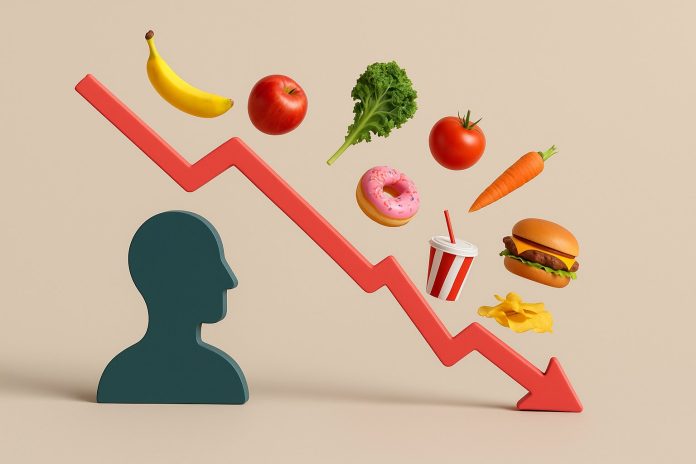Would You Eat Something With Acetaldehyde and Ethyl Acetate?
Imagine I offered you a daily dose of a substance that was so beneficial that it promises to keep medical intervention at bay. Quite an appealing offer, right? Just so you know, my miraculous substance contains compounds such as acetaldehyde, ethyl acetate, 1-butanal, ethanol, hexanal, trans-2-hexenal, ethyl hexanoate, hexanol, to name a few.
Suddenly, you hesitate. Sounds unfamiliar…unnatural.
But what if I told you this mysterious concoction is just an apple?
This simple experiment illustrates something profound about human perception: familiarity breeds comfort, while unfamiliarity, even if harmless, can spark suspicion. This dynamic is central to a major issue plaguing today’s food industry: consumer trust.
Trust in the food industry is currently in crisis. According to recent findings from the EIT Food Consumer Observatory, less than half (47%) of European consumers trust food manufacturers. Retailers and even regulatory bodies do somewhat better, barely surpassing 50%. Farmers, comparatively, fare better, holding steady at around 67%. Notably, trust levels have been trending downward over recent years, further evidenced by the rising popularity of books and media exposing “big food”.
The EIT Food Consumer Observatory largely account the fragility of trust to a pronounced lack of transparency. Consumers repeatedly voice frustrations over unclear or confusing communication from the industry, especially regarding sustainability practices, animal welfare, and sourcing. Professor Klaus Grunert, director of EIT Food Consumer Observatory, succinctly states, “When transparency is perceived to be high, trust is naturally higher.”
Yet, despite what seems like straightforward logic (more information = transparency = trust), We at Caja would argue that transparency alone might not suffice.
The response from those reporting on The EIT Food Consumer Observatory findings suggest that if consumers knew what went into their food, their scepticism would disappear. However, as our apple analogy illustrates, detailed information can sometimes increase scepticism rather than diminish it. Knowing exactly what’s in something can heighten fears precisely because those details often sound unnatural or unfamiliar.
To genuinely build trust, transparency must go beyond merely presenting lists and facts. People rarely need more data. We’re all already overwhelmed by information. Instead, the food industry needs to be aware of how human psychology actually processes uncertainty. Food manufacturers, retailers and regulatory bodies must address the emotional and intuitive factors that shape trust. Designing communication strategies that acknowledge these behavioural insights (rather than simply increasing transparency) will be crucial to genuinely reassuring consumers.
The issue reflects a widespread problem whereby expert or industry specific knowledge unintentionally excludes rather than reassures. It’s related to a cognitive bias (‘cognitive bias’ is a fancy behavioural science term meaning mental shortcut) known as the ‘illusion of transparency’, in which individuals or organisations incorrectly assume their audience understands their intentions and motivations just by providing detailed information. Taking that learning, we know that trust requires translating expert knowledge into meaningful reassurances that resonate emotionally, not just logically.
Sticking with learnings from Behavioural Science for a moment (and being cautious of further causing illusion of transparency). Consumers often rely on their intuition and cognitive biases to inform their purchasing and consumption decision making. For many, this can look like perceiving something “natural” or “low in sugar” as inherently safer or superior. My own family exhibits this, having had many debates regarding the dangers of genetically modified crops or cultivated meats, despite overwhelming evidence of safety and environmental benefits. For many consumers, “naturalness” functions as shorthand for safety and acceptability, complicating the adoption of beneficial innovations. Climate change, biodiversity loss, and resource scarcity are not looming threats; they are here now, demanding significant shifts in agriculture and food production. Successfully bridging the gap between innovation and consumer acceptance requires the industry to fundamentally reshape how it communicates. Merely educating consumers about new technologies is insufficient, messaging must engage consumers emotionally, reassuring and addressing their underlying anxieties and concerns.
Proactive measures by forward-thinking brands could include pursuing credible third-party endorsements, collaborating openly with independent authorities and NGOs, or adopting respected certifications such as B Corporation status. These approaches help demonstrate that a company values more than just profit, increasing consumer confidence and legitimacy.
Trust isn’t static. It doesn’t happen overnight or through one-off actions. Trust is earned and maintained through continuous small interactions. The future of food isn’t just about lab-grown meat or AI-powered agriculture. The companies that will thrive will be those that consistently invest in trust and see their customers as partners in shaping what food looks like, not just passive recipients of whatever innovation comes next.
The challenge to the food industry is clear: Will companies rise to meet it?
At Caja, we specialise in bridging the gap between innovation and public trust, helping organisations turn great ideas into practices people can believe in. We’re publishing this blog to offer our perspective and to show our enthusiasm for contributing to the conversation about transparency in the food industry. Our team has experience of working in a range of sectors where trust has been tested, we’ve helped rebuild confidence through behavioural insights and clear, human-centred communication. The food industry presents similar challenges and exciting opportunities. We’re excited by the challenges this sector presents, and we’re keen to collaborate with organisations who share our commitment to doing things differently.
Get in touch via e-mail at admin@cajagroup.com if you would like a conversation with the team.




